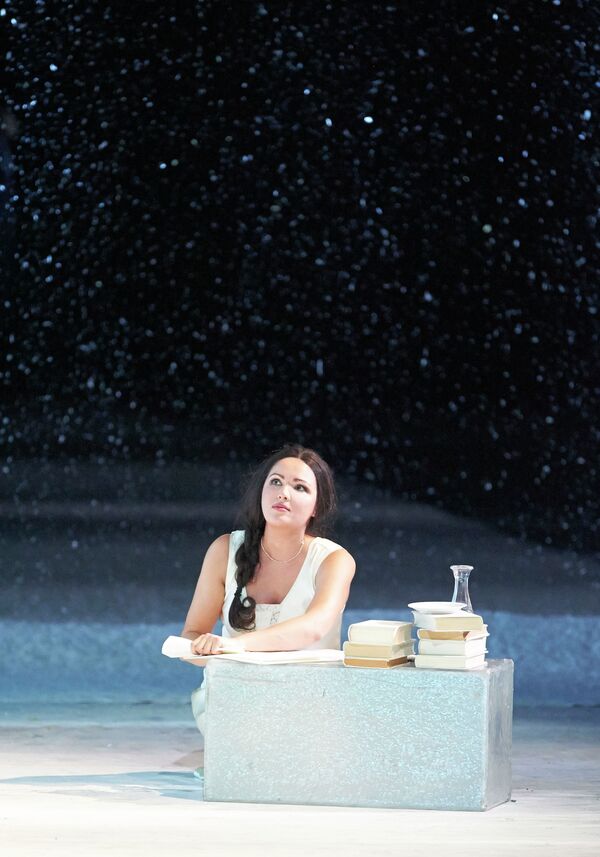VIENNA, April 24 (Andrei Zolotov Jr., RIA Novosti) – After testing the waters this spring in Vienna, glamorous Russian soprano Anna Netrebko, one of the opera world’s most acclaimed stars, is set to open the new season at New York’s Metropolitan Opera with her boldest foray yet into the Russian repertoire.
Netrebko rose to international fame for light-hearted roles, mostly French and Italian, not for reflective Russian operas, despite her Russian roots. But she won a storm of ovations this week in the Austrian capital when she appeared at the Vienna State Opera for the fourth and last time since April 12 as Tatiana – the central female part in composer Peter Tchaikovsky’s “Eugene Onegin,” and likely in the entire Russian operatic repertoire.
In September, she will kick off the Met’s fall season singing Tatiana in a new production by Debora Warner under the baton of renowned Russian conductor Valery Gergiev, director of St. Petersburg’s Mariinsky Theater, under whom the soprano began her career. It was, however, the Met’s general manager, Peter Gelb, who helped convince her to tackle the role of Tatiana.
“It took a long time to persuade me,” Netrebko told RIA Novosti ahead of her last performance in Vienna, admitting she had feared the “huge responsibility” of playing the iconic heroine of the most famous poetic work by Alexander Pushkin, revered as Russia’s most significant poet.
“Of course, I have known this opera since my childhood. I read Pushkin – that’s obvious; it's in our blood, our brains, our souls. But I never thought that I would sing this opera,” she said. “I can't remember a time when I was as nervous as before my first Tatiana. I was shaking all over.”
The role challenged Netrebko in a multitude of ways – not least of all, forcing her to overcome the differences between the pensive, romantic Tatiana and her own playful, mischievous nature.
“Tatiana has nothing in common with me personally,” she said, describing the character and herself as “absolute opposites.”
“I completely changed all of my gestures, expressions and reactions. I thought about every turn of her head – what will she do here, and is Tatiana like this or like that?” Netrebko recalled.
“None of the sharp movements that I usually make. In my lifetime I have played so many young, lively girls, who are essentially closer to me. But this was completely different, and I really had to work on it.”
Netrebko said she spent only around a month preparing for the part, but worked very intensely amid a much harder creative process than for other roles.
“The first rehearsal was awful, I couldn't understand anything that was happening onstage,” she said. “I thought, ‘My God, I have to give up. No, I can't! What shall I do? There's no time!’ There was panic.”
Musically, Netrebko struggled with some of the part’s lower passages, as well as the challenges of staying true to Tchaikovsky’s specific demands, explained to her by her accompanist, Yelena Matusovskaya, who came to Vienna from the Mariinsky Theater especially to help her prepare for the role: “You need to perform the music exactly as it is written – ‘don’t hang any ribbons on it,’ she says. But at the same time, the performance cannot be dry: It needs to be full of color and internal feelings, impressions, experience. And that's the hardest part of all.”
Netrebko mused that the role probably requires a Russian performer and, “second, you have to have lived through a lot and know how to perform it. I think that comes with experience. It doesn’t just happen.”
Netrebko’s recipe for solving the problems she encountered was to think: “So I thought. And for a first show, in my view, we laid some good groundwork." She agreed that the final act was a real success in the Vienna production because it "includes areas where I feel strong.”
Beyond the gratification and challenges of mastering a new role, Netrebko expressed hope that the performance would illuminate the works of Pushkin, and the values of a 19th-century nobility firmly rooted in anachronistic-seeming concepts of honor and dignity.
“People often ask me if this story could take place in modern times. It could not. This story belongs to the 19th century, when the concepts of nobleness, honor, pride and loyalty still existed. Nowadays, these words have virtually no meaning.”
But these are the notions central to Pushkin’s work, she added.
“Now, people try to turn it into some kind of sentimental story, and I try to explain that it is not a sentimental story but something much deeper.”
At the Metropolitan, Netrebko will sing the part of Tatiana between September 23 and October 19, starring opposite Polish baritone Mariusz Kwiecien.



